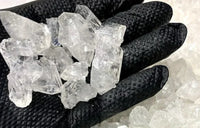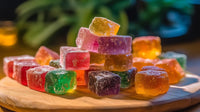Recent posts
-

-
 What Are THCa Diamonds?October 14, 2025
What Are THCa Diamonds?October 14, 2025 -
 Delta 9 Gummies GuideOctober 8, 2025
Delta 9 Gummies GuideOctober 8, 2025 -
 Head High vs Body High: A Guide to Cannabis EffectsOctober 1, 2025
Head High vs Body High: A Guide to Cannabis EffectsOctober 1, 2025 -
 What is THCA Crumble?September 22, 2025
What is THCA Crumble?September 22, 2025 -
 10 Ways to Elevate Self-Care Awareness MonthSeptember 14, 2025
10 Ways to Elevate Self-Care Awareness MonthSeptember 14, 2025

What is H4CBD?
By Zero Point
Table of Contents
TL;DR:
-
H4CBD (hexahydrocannabidiol) is a hydrogenated form of CBD, meaning chemists altered CBD by adding hydrogen atoms to it. This semi-synthetic cannabinoid is not naturally found in hemp.
-
Stronger effects than CBD: Early research and user reports say H4CBD interacts with receptors differently, making it feel like a much stronger CBD (some even call it “100x stronger”), with a mild buzz similar to a low dose of THC. In other words, it’s more potent than regular CBD but nowhere near as intoxicating as THC.
-
No intense high: H4CBD won’t get you “stoned” like Delta 9 THC, but it isn’t totally non-intoxicating either. Many describe the feeling as calm relaxation with a subtle euphoria, comparable to taking a 2:1 CBD:THC combo product.
-
Legal gray area: Because it’s derived from hemp CBD and usually contains <0.3% Δ9-THC, H4CBD appears to be Federally legal under the 2018 Farm Bill (like CBD). However, its novel status means state laws can vary, always check your local regulations.
-
New: It is new, so scientific research is limited. Use caution and buy from reputable sources. It’s typically sold as a distillate or infused in vapes and gummies, often through specialized suppliers offering bulk wholesale H4CBD Distillate for product manufacturers.
What is H4CBD?
H4CBD is a hydrogenated version of CBD, essentially CBD with a twist. Chemists take cannabidiol (CBD) and add four hydrogen atoms to its structure, creating hexahydrocannabidiol, or H4CBD for short. This process, called hydrogenation, is similar to turning vegetable oil into margarine by adding hydrogen. By changing CBD’s molecular structure slightly, H4CBD gains some unique properties that set it apart from regular CBD.
In simple terms: H4CBD starts out as the same CBD you know and love from hemp plants, but after a lab process, it behaves a bit differently in the body. It’s often described as a “semi-synthetic” cannabinoid because it doesn’t occur naturally in significant amounts, you can’t grow a cannabis strain high in H4CBD. Instead, manufacturers create it in a lab from natural CBD. (Think of how HHC is made by hydrogenating THC – similarly, H4CBD is made by hydrogenating CBD).
Key facts about H4CBD:
-
Discovered decades ago: Surprisingly, H4CBD isn’t brand-new. It was first synthesized in the 1940s by chemist Roger Adams and team (around the same time CBD itself was identified). It stayed under the radar until recently, when the hemp industry started exploring new cannabinoids.
-
Also known as “H4-CBD” or “THD”: In some articles or product listings, you might see it called by these alternate names. A few brands even marketed it under the name “PHC,” causing some confusion. No matter the nickname, it refers to the same hydrogenated CBD compound.
-
Synthetic, but hemp-derived: H4CBD is made from hemp-extracted CBD, so it’s derived from a natural source. However, because it requires a chemical transformation, it’s labeled a synthetic cannabinoid in legal/technical terms. Don’t let the word “synthetic” scare you, in this case it just means humans had a hand in creating it (much like converting CBD isolate into a new form).
Now that we know what it is, let’s dive into why H4CBD is generating buzz among cannabis users and how it actually feels.
How Does H4CBD Feel? (Does H4CBD Get You High?)
One of the big questions people have is whether H4CBD will get you high. After all, regular CBD doesn’t make you feel high at all, it’s prized for being non-intoxicating. H4CBD, on the other hand, does have some psychoactive effects, but they’re milder than a THC high.
Consumers who have tried H4CBD often say it feels like a middle ground between CBD and THC. You might experience:
-
Deep relaxation and calm (similar to CBD’s soothing effect)
-
A slight euphoria or “buzz” – not enough to impair you, but you notice something is there
-
Clear-headedness – users report they remain functional and don’t get the anxious mind-race that strong THC can cause
In practical terms, people compare H4CBD’s effects to taking a high dose of CBD along with a microdose of THC. If you’ve ever taken a 2:1 ratio CBD:THC tincture, that’s often cited as a reference point. It’s more relaxing than a pure CBD, but gentler than a typical THC product.
Importantly, H4CBD likely will not get you “stoned” or intensely high the way delta-9 THC from cannabis would. The psychoactive kick is mild. One scientific study found that after hydrogenation, the new cannabinoid (H4CBD) showed a much higher binding affinity to the CB1 receptor than CBD does. The CB1 receptor in our brain is what THC latches onto to produce a high. CBD normally barely interacts with CB1 (which is why CBD alone doesn’t intoxicate). H4CBD’s boosted CB1 activity explains why it can cause a buzz at all.
That said, don’t expect H4CBD to rival THC in terms of high: it’s more of a strong body relaxation with a mood lift. As one writer put it, taking H4CBD feels like “a big dose of CBD alongside a small dose of THC”. Many users actually appreciate this effect, you get noticeable relief (for mood, pain, etc.) with just a hint of euphoria, but you stay mostly clear-headed.
Does it make you sleepy or alert? Anecdotally, H4CBD tends to be calming. Some users find it can help with sleep or anxiety at night, while others report it’s good for daytime stress relief without knock-you-out sedation. Your experience may vary, and since it’s new, more user feedback is rolling in every day.
Bottom line: H4CBD can cause a mild high or at least a notable “presence” in your system, so treat it with respect. If you’re totally new to cannabis, you might actually feel H4CBD more than a seasoned THC user would. Start with a low dose to gauge your reaction, just as you would with any new cannabinoid.
H4CBD’s Effects and Benefits
Because H4CBD is so new, hard scientific evidence on its benefits is scarce. There haven’t been clinical trials or extensive studies on what H4CBD can treat or its full spectrum of effects. However, we can make some educated guesses (and share early observations):
-
Potential Therapeutic Effects: Given that H4CBD is closely related to CBD, many believe it may carry over some of CBD’s well-known benefits like anxiolytic (anti-anxiety) and anti-inflammatory properties. The one study from 2006 that often gets cited (which sparked the “100x stronger” buzz) suggested hydrogenated CBD showed enhanced activity at certain receptors tied to inflammation. This hints H4CBD could be a potent anti-inflammatory or pain-reliever, but more research is needed to say for sure.
-
Stress and Mood: Users commonly report feeling relaxed, less stressed, and uplifted after H4CBD. It might improve mood and take the edge off anxiety without overwhelming sedation. Think of it as CBD’s chill effects, amplified a bit.
-
Mild Pain Relief: Anecdotal feedback points to H4CBD helping with aches and pains similarly to CBD, possibly a little stronger. If CBD lotions or tinctures take the pain from a 6 to a 4 for you, H4CBD might bring it down a notch further, again, this is highly individual.
-
Little Things, Not Life-Changers: It’s important to set realistic expectations. You might notice better relaxation, improved mood, easier sleep, or mild pain reduction. But H4CBD is not proven to cure anything major, and because it isn’t wildly psychoactive, don’t expect a dramatic mind-altering experience or a miracle fix.
One big claim out there is that H4CBD is “100 times more potent” than CBD. Let’s clear that up: In lab settings, H4CBD did show a much stronger binding to CB1 receptors than CBD did (CBD barely binds at all). That led some to speculate it could be ~100x more active at that specific receptor. This does not mean H4CBD’s effects in your body will be 100 times stronger than CBD overall. In reality, experienced users say H4CBD feels a few times stronger than CBD, definitely more noticeable, but not off the charts. One expert estimated it might be around 2-3 times the potency of CBD in practical effect. The “100x” phrase has taken on a life of its own online, so take it with a grain of salt.
Are there side effects? Thus far, reported side effects of H4CBD are similar to those of other cannabinoids. Some people might experience:
-
Dry mouth (cottonmouth), mild thirst
-
Drowsiness or relaxation (desired by some, a “side effect” to others)
-
Lightheadedness if you take a lot, since it does lower pressure slightly like CBD can
-
Possible drug test issue: H4CBD itself isn’t THC, but if it metabolizes similarly or if trace THC is present in a product, there’s a slight chance it could trigger a positive on a sensitive drug test. Most standard tests look for THC metabolites specifically, so pure H4CBD shouldn’t show up. Just use caution if you’re subject to testing.
Importantly, we don’t have long-term safety data for H4CBD yet. CBD is generally considered very safe even at high doses, but since H4CBD interacts with receptors differently, we need more research. If you have medical conditions or take medications, consult a knowledgeable doctor before experimenting.
H4CBD vs. CBD: What’s the Difference?
At first glance, H4CBD and CBD look almost the same, their molecules differ by only four hydrogen atoms. Yet this small change gives H4CBD some distinct characteristics. Here are the key differences and similarities between H4CBD (hydrogenated CBD) and regular CBD:
-
Source: Both come from the hemp plant, but CBD is extracted directly from hemp flowers, while H4CBD is created by modifying CBD in a lab. In short, CBD is natural, H4CBD is synthetically derived from that natural CBD.
-
Intoxication: CBD will not get you high, no matter how much you take. It has essentially zero direct activation of the brain’s CB1 receptors. H4CBD can cause a mild high because it does activate CB1 receptors to some degree. If you take enough H4CBD, you may feel a gentle wave of euphoria or buzz, which plain CBD won’t ever do.
-
Potency: This is the tricky one. In terms of binding to certain receptors (CB1), H4CBD is dramatically more potent than CBD. But in lived experience, it’s only a few times stronger in effect. Practically, you might need a much smaller dose of H4CBD to get a noticeable calming effect compared to CBD. For example, if you normally take 50 mg of CBD to relax, you might find ~15-20 mg of H4CBD gives a similar or stronger effect. (Everyone’s different, so start low!)
-
Therapeutic Uses: CBD is well-known to help with anxiety, inflammation, pain, epilepsy (FDA-approved for seizures), and more. H4CBD’s therapeutic profile is still speculative, but it’s likely in a similar ballpark, possibly enhanced anxiety and pain relief, thanks to that increased receptor activity. One thing to note: CBD can actually reduce the psychoactive effects of THC (CBD can mellow a THC high), whereas H4CBD might add a bit of psychoactivity. So their uses might diverge if you’re very sensitive to psychoactive effects.
-
Safety & Research: CBD has been studied extensively and is considered very safe, even in large quantities. H4CBD, being new, lacks that robust research. There’s no obvious reason to think H4CBD is unsafe (chemically it’s almost CBD), but caution is warranted until we know more. If you’re worried, you can wait for further studies or stick to tried-and-true CBD for now.
In summary: H4CBD is like CBD’s stronger, slightly mischievous cousin, it offers similar benefits (relaxation, relief) but packs a bit more punch and a mild buzz. Regular CBD remains the go-to for those who want zero high. H4CBD might appeal if you found CBD too subtle and you’re okay with a touch of intoxication.
H4CBD vs. HHC: Are They the Same Thing?

It’s easy to mix up all these acronyms. HHC (hexahydrocannabinol) and H4CBD (hexahydrocannabidiol) are both hydrogenated cannabinoids, but they are definitely not the same compound.
Here’s how they compare:
-
Origin: HHC is made by hydrogenating THC (adding hydrogens to delta-9 THC or a related THC molecule). In contrast, H4CBD is made from CBD. So HHC is essentially a hydrogenated THC, whereas H4CBD is hydrogenated CBD.
-
Effects: Because HHC is a hydrogenated form of THC, its effects are much more like a traditional THC high – euphoric, intoxicating, and psychoactive. Users say HHC’s high is a bit less potent than delta 9 THC but stronger than delta 8 THC. H4CBD’s effects are gentler, more akin to a strong CBD dose with light euphoria. HHC will get most people high (moderately), while H4CBD only gives a subtle high or just deep relaxation.
-
Legal status: Both HHC and H4CBD exist in a similar gray area under hemp laws. HHC, being a THC relative, is facing more scrutiny and has even been banned in some states explicitly. H4CBD, being a CBD relative, is flying under the radar more but could attract attention as it becomes popular. Neither are explicitly listed as controlled substances federally, but state laws vary.
-
Uses: HHC is often used by those seeking a legal THC substitute – something to vape or eat for a recreational high. H4CBD is aimed more at wellness and therapeutic uses with a twist of euphoria. You’ll find H4CBD in products marketed for relaxation or pain relief, whereas HHC products are often sold as euphoric or recreational (similar to delta-8 or delta-10 THC products).
Think of it this way: H4CBD is to CBD what HHC is to THC. Each hydrogenated cannabinoid mimics its original to a degree, but HHC inherits THC’s intoxicating nature (just a tad toned down), and H4CBD inherits CBD’s non-intoxicating nature (just a tad spiced up).
Is H4CBD Legal in the US?

Legally, H4CBD currently exists in a gray zone but as of now it appears to be legal under federal law. The 2018 Farm Bill legalized hemp and hemp-derived compounds as long as they contain no more than 0.3% delta-9 THC. H4CBD is derived from hemp CBD and most H4CBD products are formulated to meet that <0.3% Δ9-THC requirement, so they qualify as hemp products.
A few points to consider:
-
Not THC or an analog (technically): H4CBD is not a THC analog; it’s a CBD analog. That’s good news because many state bans target analogs of THC (like delta-8, delta-O, HHC, etc.). H4CBD might dodge some of those because it’s structurally closer to CBD. For example, it’s been noted that H4CBD “enjoys the same legal protections as CBD under the Farm Bill” since it’s not delta 9.
-
State laws can differ: Despite federal law, some states have broader bans on “intoxicating hemp derivatives” or specifically outlaw certain synthetically made cannabinoids. While H4CBD hasn’t been explicitly banned in most places (simply because it’s so new), that could change. Always check if your state has updated its hemp or cannabis laws. A state might lump H4CBD in if they ban all modified cannabinoids regardless of source.
-
Future regulations: The landscape is rapidly evolving. As H4CBD gains popularity, regulators may take a closer look. It’s wise to stay informed. For now, buying H4CBD online or in shops is generally possible in the US, especially through hemp companies who ship nationwide. Just do your due diligence to ensure the product has lab testing and is within legal THC limits.
In short, H4CBD is likely legal where CBD is legal, but since it does have mild psychoactive effects, use it responsibly and keep an eye on legislative changes. When in doubt, consult legal resources or local authorities on hemp laws in your area.
Should You Try H4CBD? (Practical Advice)
If you’re a cannabis or CBD user in the US, you might be intrigued by H4CBD and wondering if it’s worth a go. Here are some practical insights to help you decide:
-
For CBD Enthusiasts: If you love CBD for its anxiety or pain relief but sometimes wish it had a little more kick, H4CBD could be interesting. It might provide that extra relief or relaxation that CBD alone doesn’t always give. Think of it as CBD on steroids (just not literally 100x stronger, despite the buzz). Start small, though – maybe try a tiny dose of an H4CBD vape or a low-milligram gummy, since it can surprise you compared to standard CBD.
-
For THC Users: If you’re accustomed to the high from THC (whether delta-9 from marijuana or delta-8/HHC from hemp), H4CBD will feel very mild. You might actually appreciate it as a daytime option when you don’t want to be fully high. Some THC users mix H4CBD with a bit of THC for a balanced effect. Just remember, H4CBD won’t replace your THC if you’re seeking a strong buzz; it’s more for taking the edge off or enhancing calmness.
-
For New or Sensitive Users: H4CBD could be a double-edged sword. On one hand, it’s milder than jumping straight into THC, so it might be a gentle introduction to something beyond CBD. On the other hand, if you’re very sensitive or anxious about feeling “high,” you should approach H4CBD carefully. Maybe stick with a small dose CBD product first. If you do try H4CBD, do it in a comfortable environment and be mindful of how you feel.
-
Product Types: Right now, H4CBD is most commonly found in vape cartridges and gummies/edibles. A few tinctures or capsules might exist, but vapes and gummies dominate. You might also encounter H4CBD sold as a pure distillate oil – a thick, golden oil that manufacturers use to make those vapes and edibles. High-quality H4CBD distillate should be lab-tested and free of residual solvents or unwanted additives. If you’re a DIY type or looking to formulate your own products, you can even purchase bulk H4CBD distillate (some companies offer wholesale H4CBD Distillate for this purpose) to infuse into oils or edibles. For most consumers, though, a ready-made vape or gummy is the convenient choice.
-
Mixing with other cannabinoids: Some products blend H4CBD with other cannabinoids like delta 8 THC, HHC, or traditional CBD. The idea is to harness the “entourage effect,” where multiple cannabinoids work together. For example, an H4CBD + delta-8 combo gummy could give a relaxed high with the calming body feel of H4CBD and the uplifting head feel of delta-8. There’s a lot of experimentation in the market. If you go this route, just be mindful that adding THC analogs will increase intoxication.
Final tip: As with anything new, start low and slow. You can always take more, but you can’t undo a dose. Even though H4CBD is mild, you want to ensure the experience is positive. Many users report that around 10-30 mg oral or a few puffs of a vape is a good starting zone. Effects from vapes come on fast (minutes) and last an hour or two; edibles kick in slower (30-90 minutes) and can last several hours.
The Bottom Line
H4CBD is an exciting newcomer in the cannabis world, sitting in a unique spot between CBD and THC. It offers a fresh experience for those looking for more than CBD’s subtle effects but less than a full THC high. To recap the highlights:
-
H4CBD = hydrogenated CBD, a lab-made twist on cannabidiol that’s stronger and a bit psychoactive.
-
It’s getting attention for claims of high potency (though “100x stronger” is an exaggeration in practice).
-
Users say it provides enhanced relaxation, mood lift, and mild euphoria without the impairment of typical weed.
-
Legality is federally on par with hemp CBD (for now), but always double-check state laws.
-
It’s available in vapes, edibles, and distillate form – just ensure you buy from reputable vendors with lab tests for purity and potency.
-
If you choose to try H4CBD, dose carefully and see how it personally affects you. Everyone’s endocannabinoid system is a bit different!
As the cannabis industry continues innovating, H4CBD is just one of many new cannabinoids making waves. Whether you’re a curious newbie or a seasoned cannabinoid connoisseur, staying informed is key. Enjoy exploring H4CBD if you do, and may it bring you the relief or relaxation you seek, with a nice little buzz on top.
Frequently Asked Questions About H4CBD
What is H4CBD?
H4CBD is a hydrogenated form of CBD, meaning it’s made by adding hydrogen atoms to CBD in a lab. This changes how it interacts with your body, making it slightly psychoactive.
Is H4CBD natural or synthetic?
It’s semi-synthetic. It starts as natural hemp-derived CBD, but it's modified in a lab, so it doesn’t occur naturally in the plant.
Will H4CBD get me high?
Not in the same way THC does. It may cause a mild, calming buzz or light euphoria, but not a full “stoned” feeling.
How does H4CBD compare to CBD?
It’s more potent and mildly psychoactive. CBD is non-intoxicating and gentle, while H4CBD is stronger and interacts with CB1 receptors.
Is H4CBD legal?
Federally, yes, if it’s derived from hemp and contains less than 0.3% delta-9 THC. State laws vary, so check your local rules.
What are the benefits of H4CBD?
Early feedback suggests it may help with anxiety, mood, pain, and relaxation. Research is still limited.
Can H4CBD show up on a drug test?
It’s unlikely, but possible. While H4CBD isn’t THC, some tests may not distinguish between cannabinoid types, especially if THC traces are present.
What products is H4CBD available in?
You’ll find it in vapes, gummies, tinctures, and as distillate for wholesale or DIY use.
How should I dose H4CBD?
Start low - around 10-20 mg orally or 1-2 puffs of a vape - and wait to feel the effects. It’s stronger than CBD.
Where can I buy H4CBD?
Look for reliable vendors that offer lab-tested products. For bulk or formulation needs, check out wholesale H4CBD Distillate.








